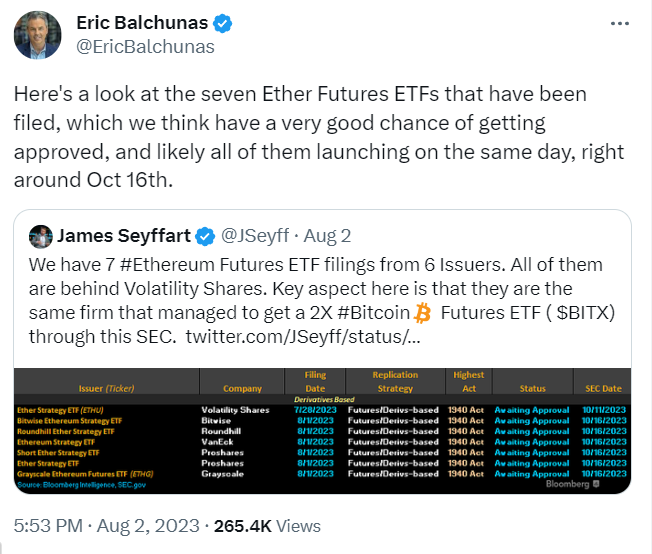Ethereum Futures ETFs Explained

This blog post will cover:
- What are futures ETFs?
- What are Ethereum futures ETFs?
- What is known about Ethereum futures ETFs so far?
- Conclusion
Recently, the cryptocurrency community began to engage in discussions regarding the potential approval of Ethereum futures exchange-traded funds (ETFs) by the US regulatory body, the Securities and Exchange Commission (SEC). This emerging development has garnered substantial interest and even spurred a notable increase in Ethereum's price.
In this article, we will analyze the notion of Ethereum futures ETFs and explore their importance within the cryptocurrency landscape.
What are futures ETFs?
Futures ETFs are a kind of investment instrument that is similar to the traditional ETFs and futures contracts at the same time:
- ETFs are collections of assets that can be traded on exchanges, similar to individual stocks. These baskets typically contain a mix of assets (stocks, bonds, etc.), and they are created to track the performance of a specific index or asset class.
- Futures are contracts to purchase or sell a particular asset, like commodities (e.g., oil, gold), financial instruments (e.g., stock indices), and so on at an agreed-upon price sometime in the future.
Futures ETFs combine these two concepts. They are ETFs that put money in futures contracts instead of purchasing the actual physical assets. For example, a crude oil futures ETF would invest in oil futures contracts instead of physically storing barrels of oil.
Futures can be a useful instrument for investors because they allow investors to access markets and assets that might be challenging to trade directly, such as commodities or foreign currencies, while still benefiting from diversification.
What are Ethereum futures ETFs?
Given the SEC greenlights this type of funds, Ethereum futures ETFs would serve as an instrument enabling people to invest in the second most popular crypto without directly acquiring and holding the asstets. Instead, investors would purchase ETF shares, which represent ownership in a diversified collection of Ethereum futures contracts.
The ETF's value in this scenario would closely follow the performance of the Ethereum futures contracts within its portfolio. When Ethereum's price surges, the worth of these futures contracts likewise increases, resulting in profits for ETF shareholders.
An important advantage of Ethereum futures ETFs lies in their accessibility and liquidity. These ETFs would be actively traded on conventional stock exchanges, which is much more convenient for those investors who do not have profound knowledge of the crypto platforms or are not tech-savvy in general. Additionally, they would offer liquidity, allowing investors to effortlessly trade ETF shares during regular trading sessions.
What is known about Ethereum futures ETFs so far?
As of August 24, 2023, twelve different investment companies have submitted applications for this type of fund. The ETFs will operate with the ETH futures contracts on the Chicago Mercantile Exchange. While the specific ETF approvals remain uncertain, indications from experts imply that some applications could potentially receive the go-ahead as early as October 2023.
 Here are some of the proposals submitted to seek approval from the SEC:
Here are some of the proposals submitted to seek approval from the SEC:
- Volatility Shares. This firm aims to blaze a trail with its Ethereum-focused ETF, which they named the Ether Strategy ETF (ETHU). This prospective ETF plans to allocate as much as a quarter of its resources into cash-settled Ether futures contracts. Notably, it won't directly possess Ethereum, and its shares are planned for listing on the CBOE BZX Exchange.
- Bitwise. After retracting its original submission in May, Bitwise refiled its application for the ETF in August. Its approach revolves around putting money in cash-settled ETH futures expiring in the following month, steering clear of being exposed to Ethereum's current market price directly.
- Roundhill Investments. This company is gearing up to diversify its product offering with the launch of the Roundhill Ether Strategy ETF. Roundhill plans to designate a maximum of 25% of its assets to a subsidiary situated in the Cayman Islands.
Conclusion
If the SEC moves further with the submitted applications, it can be considered an achievement for the whole industry. So far, the regulator’s policy has been very much against everything crypto, which has been shaken a little recently after Ripple’s partial victory over the SEC in court. Allowing the crypto futures ETFs can be the next step towards normalizing such assets in the US and making them more accessible to the general public.
Although the decision has not been made public as of August 24, 2023, Ethereum has shown growth in its price staying above the $1,800 mark in the first half of August (it then underwent correction).
The outcome looks to be positive: there are examples of Ethereum ETFs functioning well in other places, for instance, Brazil. Additionally, while the SEC has shown reluctance towards Bitcoin ETFs based on its current market price, the United States saw the introduction of the futures ETFs back in 2021.

